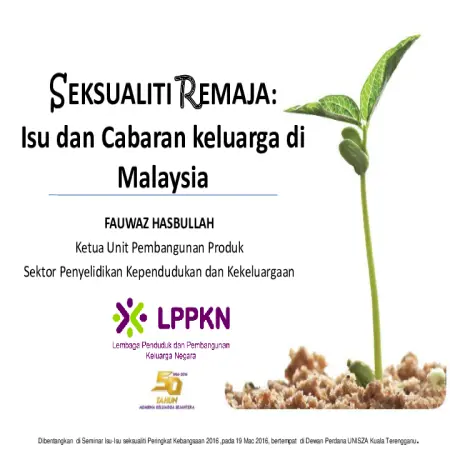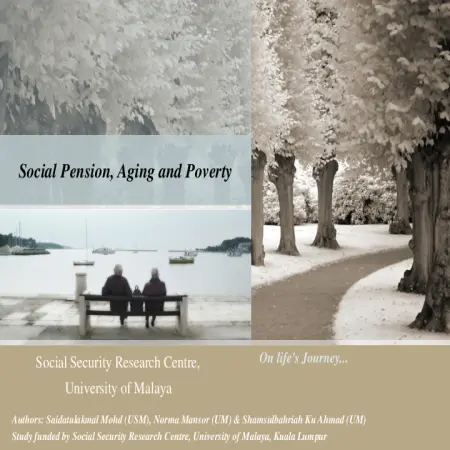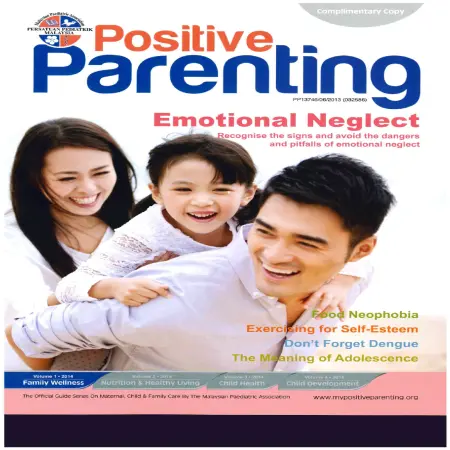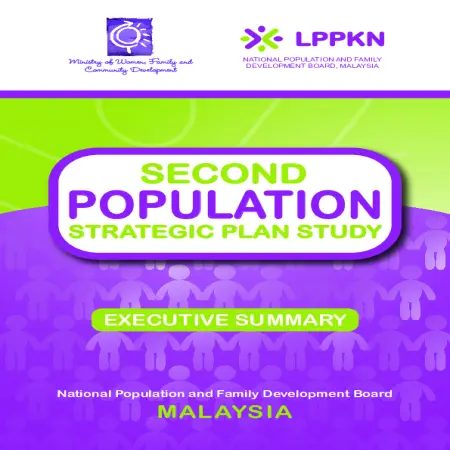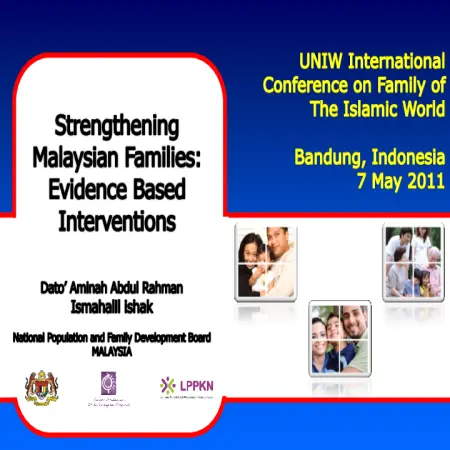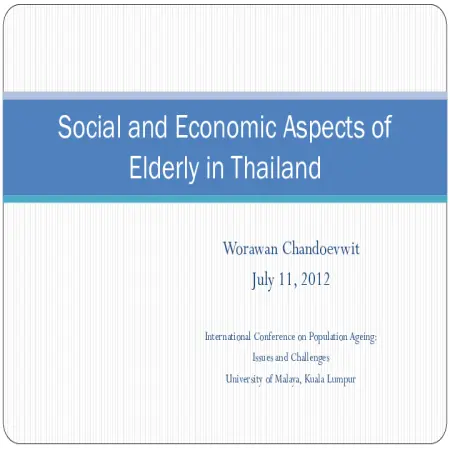Browse by Year
|
|
Selamatkah mainan anak anda?
Item Type: Article
Editor:
Year: 00/04/2015
Abstract: Children's toy can help the educational and developmental process of children at an early age. However, the selection of children's toys needs to be done wisely especially if it involves safety aspects. If parents do not carefully choose toys, it can invite danger to the safety of children. To ensure the safety of children and prevent accidents or unwanted incidents, some things that need to be considered include choosing toys according to the level of age suitability of children, toys not made of toxic materials, avoid toys that contain magnetic materials or batteries to little children and toys that have noise.
|
|
|
|
|
|
Sosialisasi dan kawalan sosial dalam kehidupan remaja berisiko: kajian kes di projek Perumahan Rakyat (PPR) Sri Pahang, Bangsar dan Sri Pantai, Lembah Pantai, Kuala Lumpur
Item Type: Thesis
Editor:
Year: 00/00/2015
Abstract: This study focused on a group of adolescents categorized as adolescents at risk in the People's Housing Project (PPR) area in urban areas. Purpose of the study is to identify and understand the life patterns of at -risk adolescents includes their involvement in deviant behavior, the role of socialization agents and forms of social control in the lives of at -risk adolescents. This study uses design qualitative form using in -depth interview and observation methods did not participate. A total of 10 teenagers consisted of six boys and four women aged between 16 to 22 years from PPR Sri Pahang, Bangsar and PPR Sri Pantai, Lembah Pantai have been purposefully selected.
|
|
|
|
|
|
Seminar Antarabangsa Kekeluargaan di Persada Johor pada 13 Februari 2014.
Item Type: Video
Editor:
Year: 13/02/2014
Abstract: Johor College of Islamic Studies (MARSAH) in collaboration with the National Population and Family Development Board (NPFDB), Ministry of Women, Family and Community Development and Johor Bahru City Council (JBCC) took the initiative to organize the International Conference on Family from a Global Perspective to contribute towards development efforts ummah in an integrated manner based on a tajdid approach that takes into account the ideas of ijtihad that are deemed appropriate to be implemented in today’s society. The objective of this conference is to expose issues related to family institutions from a global perspective, explore views related to family issues especially children's rights from an Islamic perspective, explain the position and stance of Islam on family issues that touch on matters related to religion, social, culture, education and so on. In addition, look at the legal provisions related to children in Malaysia and the Southeast Asian region and others. The era of globalization is a century that greatly challenges the integrity of identity and survival of Muslims today, including family institutions. In facing the challenge, Muslims need to plan a futuristic agenda based on the development that will take place in the future. This is in line with the theme of the conference, "Challenges and Future of Islamic Family Institutions". This one-day conference consists of three slots: i) Adopted Children and Illegal Children in Islam ii) Hukum Hakam Related to Marriage in Islamic Family Law iii) Challenges in Islamic Family Issues The main speech in the conference was Honoured Tun Dr. Mahathir bin Mohamad, former Prime Minister of Malaysia. Conference paper presenters include senior lecturers from Institutions of Higher Learning in and outside the country including from Thailand, Brunei Darussalam and Indonesia. The one-day conference was attended by 300 participants consisting of officials from government agencies, non-governmental organizations (NGOs), research institutions, academics, professional organizations and Higher Institutions students.
|
|
|
|
|
|
Social pension, aging and poverty in Malaysia
Item Type: Conference or Workshop Item
Editor:
Year: 00/00/2014
Abstract: The increasing number of elderly in Malaysia calls for a more stringent policy to safeguard the well-being of the elderly. The old age protection such as the pension scheme, Employees Provident Fund and the old age cash assistance although in tact, deemed to be inadequate to eradicate elderly poverty. One possible solution to secure financial protection during old age is through social pension that provides non-labor income for the retirees or elderly with the purpose of preventing or reducing elderly poverty. This paper attempts to estimate the financial cost of social pension scheme and quantify its potential role in reducing elderly poverty in Malaysia. The financial cost of social pension scheme was calculated as a percentage to GDP. By using the 2009 household income expenditure survey, the paper estimated the potential roles of social pension in eradicating elderly poverty. Sensitivity analysis indicated that the cost social pension could be kept at an average of 1.30 percentage of GDP. The 2009 HIES data also indicated that poverty could be eventually be eradicated with social pension while cost of the social pension was kept at reasonable levels.
|
|
|
|
|
|
Sharing responsibilities
Item Type: Article
Editor:
Year: 00/00/2014
Abstract: Traditionally, women have assumed the role of the caregiver, while husbands sought to provide financial support for their families. Society has come a long way since and women are now leaders and working professionals in their own right.
Increasingly, the domain of marriage is becoming a partnership between husband and wife. Household responsibilities and domestic affairs are no longer a one-way street, but are managed together and shared.
|
|
|
|
|
|
Socio-economic determinants of pap smear screening among married women in Peninsular Malaysia
Item Type: Article
Editor:
Year: 00/02/2013
Abstract: This study is to identify the influences of socio-economic factors towards the practice of Pap smear screening among ever married women. Bivariate correlations and logistic regression analysis was applied to the data set containing 3,283 ever married women age 15-49 years, interviewed during the Fourth Malaysian Population and Family Survey, 2004. It was found that only half the women had undergone Pap smear screening prior three years of survey, in which Chinese had the highest percentage of Pap smear screening. The logistic statistical analysis also had identified several variables has important determinant has of Pap smear screening for ever married women. Finding from this study suggest a significant relationship between the cervical cancer awareness and knowledge, age and ethnicity for those women who practice Pap smear screening.
|
|
|
|
|
|
Second Population Strategic Plan Study : Executive Summary
Item Type: Book
Editor:
Year: 00/09/2012
Abstract: The Second Population Strategic Plan Study was conducted from July 2008 – December 2009 by the Ministry of Women, Family and Community Development through the National Population and Family Development Board. This study is a follow-up to the 1st Population Strategic Plan Study conducted in 1992. The objectives of the Second Population Strategic Plan Study are to assess and evaluate the implementation of the national population programme in the context of current policies; and to recommend a strategic plan of action framework for the implementation of future population and development programmes.
|
|
|
|
|
|
Strengthening Malaysian families: evidence based interventions
Item Type: Conference or Workshop Item
Editor:
Year: 00/00/2012
Abstract: Malaysian families today are facing numerous challenges related to changing family relationships, values, need for work life balance and support systems. Some of these key challenges are as a result of a new family forms, postponement of marriage, declining fertility and effects of inflation on family economic stability. At the same time, the impact of globalization has led to different values accepted by the young. Indeed, the challenges that Malaysian families will be facing in the future will be enormous. Despite changes in the structure, families remain the most basic unit of society and this has led to the formulation of the National Family Policy (NFP). The NFP seeks to increase the family perspective in all socio-economic development design by engaging the public, private and people sectors. The Ministry of Women, Family and Community Development through National Population and Family Development Board (NPFDB), lead the family programme which includes formulation, review as well as getting the commitment of all stakeholders. Current programmes were value added based on knowledge and information from censuses, surveys, opinion polls, local views and assessment of programmes.
|
|
|
|
|
|
Social and economic aspects of elderly in Thailand
Item Type: Conference or Workshop Item
Editor:
Year: 00/00/2012
Abstract: Thailand is already an aging society. About 14% of population are elderly. Using a national survey, it can be shown that 16% of elderly households in the rural area have substandard living condition. The majority of elderly (60%) rely on remittance for their living. About 20% of elderly have to work for living and only 4% have government pension. Thailand is now organizing a National Saving Fund to promote saving for retirement. Another national survey finds that 80% of population want to save for their retirement but only 48% think that they can make regular monthly saving. This is consistent with another survey which finds that 50%-60% of elderly actually prepared themselves physically and mentally into the elder period. Elderly are less happy than the young. They are quite healthy, about 90% of those in the 65-74 age group can take care of themselves. It was quite normal in the Thai culture that children take care of their old parents. Above 80% of population expect that their children will take care of them physically, mentally, and financially when they become old. Taking care of old parents is something done by daughter. About 45% of elderly who are older than 94 years are taken care by daughter or daughter-in-law, another 38% take care of themselves. UN projects that Thailand will have 20 million elderly in the next 20 years which makes the elderly account for 26% of population or 45% of working age population. Without income security and long term care schemes for elderly, it would be very difficult for children to take care of their parents.
|
|
|
|





